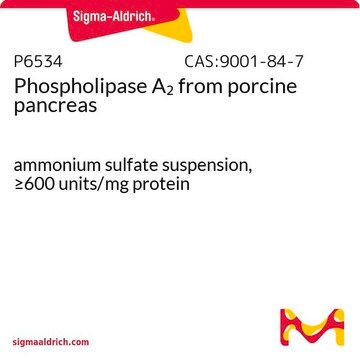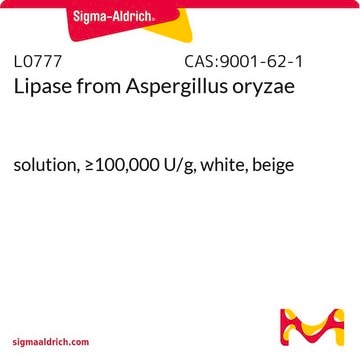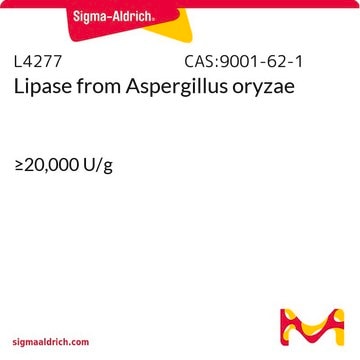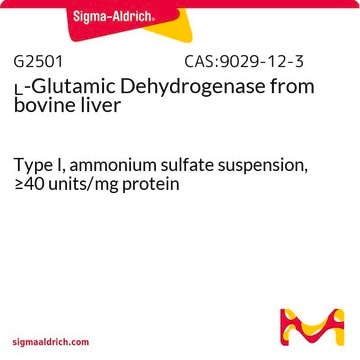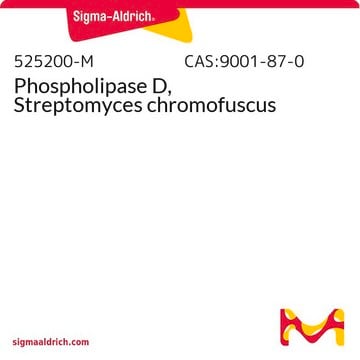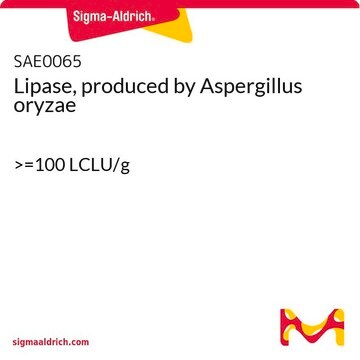L3295
Phospholipase A1 from Aspergillus oryzae
Synonym(s):
Lecitase™ Ultra, PLA1
Sign Into View Organizational & Contract Pricing
All Photos(1)
About This Item
MDL number:
UNSPSC Code:
12352204
NACRES:
NA.54
Recommended Products
recombinant
expressed in Aspergillus oryzae
form
liquid
specific activity
≥10 KLU/g
storage temp.
2-8°C
General description
Phospholipase A1 (PLA1) catalyzes the hydrolysis of acyl group from position 1 of lecithin to yield lysolecithin. It is expressed in a wide range of organisms such as rat platelets, bovine brain and testis, hornet venom, bonito muscle and fungi. Gene coding for PLA1 consists of four exons and three short introns spanning 1,056bp of genomic DNA. Mature protein contains 269 aminoacids and two possible N-glycosylation sites (Asn27 and Asn55).
Application
Phospholipase A1 from Aspergillus oryzae has been used:
- in the preparation of sn-1 and sn-2 C18:1- lysophosphatidylcholine (LPC) regioisomer standards
- as a catalyst for the synthesis 6-O-glucosyl-poly(3-hydroxyalkanoates) in a micro-aqueous system
- to catalyze the synthesis of methyl butanoate and methyl benzoate flavor esters in continuous flow microreactor
- to hydrolyze 17:0 phosphocholine (PC)
Analysis Note
minimum activity 10 KLU/G liquid
Legal Information
Lecitase is a trademark of Novozymes Corp.
Signal Word
Danger
Hazard Statements
Precautionary Statements
Hazard Classifications
Resp. Sens. 1
Storage Class Code
10 - Combustible liquids
WGK
WGK 1
Flash Point(F)
Not applicable
Flash Point(C)
Not applicable
Certificates of Analysis (COA)
Search for Certificates of Analysis (COA) by entering the products Lot/Batch Number. Lot and Batch Numbers can be found on a product’s label following the words ‘Lot’ or ‘Batch’.
Already Own This Product?
Find documentation for the products that you have recently purchased in the Document Library.
Customers Also Viewed
Structure and function of phosphatidylserine-specific phospholipase A1
Aoki J, et al.
Biochimica et Biophysica Acta, 1582(1-3), 26-32 (2002)
C Preston Moon et al.
Proceedings of the National Academy of Sciences of the United States of America, 108(25), 10174-10177 (2011-05-25)
The transfer free energies of the twenty natural amino acid side chains from water to phospholipid bilayers make a major contribution to the assembly and function of membrane proteins. Measurements of those transfer free energies will facilitate the identification of
Yuh-Ren Chen et al.
Archives of microbiology, 193(6), 419-428 (2011-03-10)
The lysis protein of the colicinogenic operon is essential for colicin release and its main function is to activate the outer membrane phospholipase A (OMPLA) for the traverse of colicin across the cell envelope. However, little is known about the
Molecular cloning and expression of the gene encoding a phospholipase A1 from Aspergillus oryzae
Watanabe I, et al.
Bioscience, Biotechnology, and Biochemistry, 63(5), 820-826 (1999)
Enzymatic synthesis of 6-O-glucosyl-poly (3-hydroxyalkanoate) in organic solvents and their binary mixture
Gumel AM, et al.
International Journal of Biological Macromolecules (2013)
Our team of scientists has experience in all areas of research including Life Science, Material Science, Chemical Synthesis, Chromatography, Analytical and many others.
Contact Technical Service